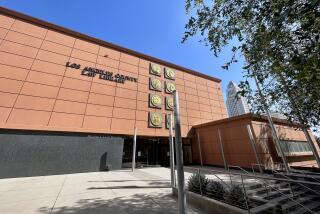Service Plans Make a Case for Justice
- Share via
Visiting a lawyer can be more painful than going to the dentist. At least that is what many people seem to think, according to William A. Bolger, the director of the National Resource Center for Consumers of Legal Services.
“Most of us fail to seek legal assistance when we should, procrastinate when we can and hire the first lawyer we talk to,” says Bolger.
Bolger’s Washington-based group is trying to enhance consumer access to legal services by promoting the concept of free legal-services plans. He has written a booklet describing how local groups can start their own plans.
Free, Limited Consultations
A free legal-services plan makes available free, limited consultations and certain routine services. More involved legal problems still are covered, but at a discount--usually 25%--through pre-selected lawyers. “A plan promotes preventive law by letting a member talk to a lawyer whenever the member thinks there might be a problem, without fear of the cost,” explains Bolger.
Only a group has the clout to negotiate for free consultations and discounts. Lawyers are willing to provide free services because they hope to build a paying client base from those group members who need more in-depth legal assistance. The lawyers see it as a way to improve the volume of their business.
The free consultations are usually limited to 30 minutes but are unlimited in number--so you can keep coming back with different legal questions. Some plans also call for free follow-up services, such as a letter, if that will take care of the problem.
There are also many prepaid plans in existence, where members pay a monthly fee for similar services.
If your local, civic, or community group is interested in designing a free legal-services plan, Bolger says it’s as easy as 1-2-3. Get yourself a copy of his brochure. Call or write the National Resource Center for Consumers of Legal Services, 124-D E. Broad St., Falls Church, Va. 22046, (703) 536-8700. The group also publishes an in-depth manual and will answer general questions about legal-services plans at no charge. More extensive help is available for a fee.
There are three basic steps to take. First, design the plan. Decide what level of legal services should be included. Will the free services include only 30-minute consultations or will lawyers also review basic documents, such as leases, without charge? Are there any custom benefits that your group would like? If you want to encourage group members to provide in their wills for charitable donations to the group, maybe special discounts on drawing up wills should be considered. Also, be sure to establish a grievance procedure so that any group member who is not satisfied with a lawyer’s performance has an appropriate place to register a complaint.
List of Lawyers Available
Next, your group will need to interview and select lawyers for the plan. The National Resource Center has a list of lawyers interested in participating in free plans. Finally, you’ll need to publicize the program and encourage it to be used. Even though an average American needs a lawyer about three times a year, says Bolger, only 1 in 10 actually consults a lawyer. And two-thirds of the American public have not used a lawyer more than once in a lifetime. So, group members will have to receive explanations of the advantages of free lawyer consultations and will need encouragement to actively participate.
There are already about 30 million people covered by legal-services plans.
More to Read
Inside the business of entertainment
The Wide Shot brings you news, analysis and insights on everything from streaming wars to production — and what it all means for the future.
You may occasionally receive promotional content from the Los Angeles Times.










